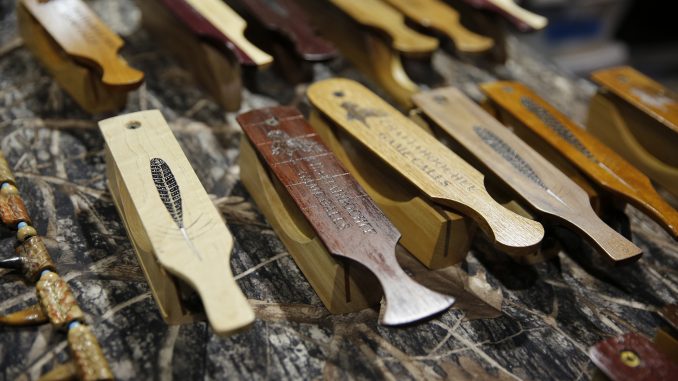
RALEIGH — The soundtrack for the Dixie Deer Classic consisted of yelps, shrieks, clucks and purrs that echoed off the walls of the Jim Graham Building.
While the cacophony may not have meant much to the hundreds of people roaming the aisles, it likely would have sounded like Barry White to a wild turkey.
The extremely lifelike sounds came from the hand-crafted devices of Sam Pope, an Alabama-born hunter who has sold his calls at hunting shows like the Dixie Deer Classic for decades.
Pope began hunting with his father at age 8 and bagged his first turkey on his own at 14. Now, close to 50 years later, he estimates that he’s taken down more than 300 turkeys. A turkey a day isn’t unusual when Pope is on a hot streak.
While it takes a variety of skills to have a hunting career like Pope’s, including patience, powers of observation and knowledge of the birds and woods, a skilled woodworker’s hand doesn’t hurt either.
Pope learned to make turkey calls from his father, who perfected a call known as a scratch box. Looking like a small jewelry box, a skilled practitioner can use it to produce just about every noise a turkey can produce.
“My dad was doing it back in the ’40s,” Pope said. “After he got out of World War II, he was giving them away.”
Eventually, he realized that people were willing to pay for something that would help improve their odds in the woods. Together with son, Sam, the Popes began what eventually became Chattahoochee Game Calls.
The secret to the remarkable sound is basically the handcrafted version of nails on a chalkboard.
“Friction,” Pope said. “You just have to have that ridge on the bottom of the lid hit the lip on the box just right.”
The wooden scratch boxes feature a dazzling array of materials. Chattahoochee’s web site features boxes carved from walnut, ash, cedar, maple, birch and cherry, as well as more exotic wood, such as bloodwood, Osage orange and padauk.
“I feel like this is one of the best,” Pope said, displaying a colorful box. “I like it. It’s purple heart and walnut. I also like this one — the cherry and cedar.”
Over the years, Pope has added several other types of calls to his inventory. He makes a hands-free call that he popped out of his mouth midway through the interview.
“You can use that, and then you don’t have to move anything,” he said, before putting it back in his mouth and producing a clucking sound.
Other calls are made from everything from aluminum and slate to crystal glass to frying pan copper.
Then there are the ones made from previous kills.
“That’s actually the three bones out of the hen’s wing,” Pope said, demonstrating a horn-shaped call. “That’s what the Native Americans used, years ago.”
Basically, if a material can produce a noise when it’s struck, dragged or blown through, Pope can probably make a call out of it. There’s no magic to getting the sound exactly right, just patience.

“Trial and error,” he said. “That’s all it is. You’ve just got to go out in the woods, listen and match it.
“Of course,” he added, “when you’ve been making them for as long as I have, you kind of know how to get that sound right.”
While Pope has his full inventory at his disposal, he said that hunters really only need two or three different calls, and that just learning a few basic sounds will likely produce success. Often, when he’s in the woods, he starts with other bird calls, trying to lull turkeys into beginning their chatter with an owl or crow call. If that fails, he’ll switch to one of his boxes.
Pope offers a lifetime guarantee on all of his scratch boxes. If customers have a problem, they can send it back with a note explaining what went wrong, and he’ll send out a new one to replace it.
“If you don’t sit on it or drop it or lose it, it’ll last you a lifetime,” he said.
Not only won’t the scratch box wear down with all the friction, it gets better with age. “The more you run it,” he said, “the better they sound.”
Pope also recommends that hunters try to avoid dropping it in a pond, but even that isn’t a death sentence.
“If you dry it out really quick and not let it sit there and be wet,” he said, “it’ll probably be all right.”
Dixie Deer Classic is put on by Wake County Wildlife Club, which uses the funds for conservation and education and for Hunter Safety Education. Find out more about its programs at dixiedeerclassic.org.



